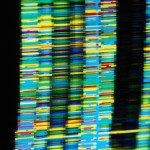Link to Pubmed [PMID] – 17675409
Proc. Natl. Acad. Sci. U.S.A. 2007 Aug;104(33):13467-72
Upon infection, pathogens reprogram host gene expression. In eukaryotic cells, genetic reprogramming is induced by the concerted activation/repression of transcription factors and various histone modifications that control DNA accessibility in chromatin. We report here that the bacterial pathogen Listeria monocytogenes induces a dramatic dephosphorylation of histone H3 as well as a deacetylation of histone H4 during early phases of infection. This effect is mediated by the major listerial toxin listeriolysin O in a pore-forming-independent manner. Strikingly, a similar effect also is observed with other toxins of the same family, such as Clostridium perfringens perfringolysin and Streptococcus pneumoniae pneumolysin. The decreased levels of histone modifications correlate with a reduced transcriptional activity of a subset of host genes, including key immunity genes. Thus, control of epigenetic regulation emerges here as an unsuspected function shared by several bacterial toxins, highlighting a common strategy used by intracellular and extracellular pathogens to modulate the host response early during infection.








